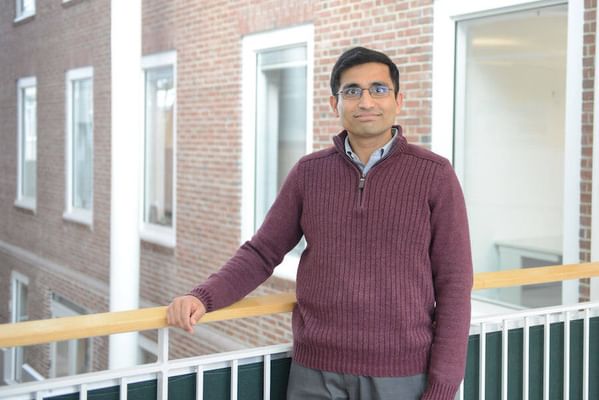- Undergraduate
Bachelor's Degrees
Bachelor of ArtsBachelor of EngineeringDual-Degree ProgramUndergraduate AdmissionsUndergraduate Experience
- Graduate
Graduate Experience
- Research
- Entrepreneurship
- Community
- About
-
Search
All Thayer News

Dartmouth Engineering Team to Help Decarbonize UN Peacekeeping Missions
Dec 13, 2023 | Irving Institute
Vikrant Vaze, Stata Family Career Development Associate Professor of Engineering, and Steven Peterson, Senior Engineering Lecturer, will work with Dartmouth's Dickey Center for International Understanding and Irving Institute for Energy and Society to develop a decision-making framework to help decarbonize United Nations (UN) peacekeeping missions in fragile states.

Vikrant Vaze, Dartmouth's Stata Family Career Development Associate Professor of Engineering.
The UN estimates that between 20–40% of the energy produced and consumed in five key conflict areas in Africa is from UN peacekeeping missions—primarily due to the use of diesel fuel. In spring 2023, the Dickey Center hosted a workshop, Powering Peace: Supporting Renewable Energy for Fragile States, focused on this challenge. The event brought together some of the world's foremost experts in this space and "took a multi-disciplinary look at how to accelerate the transition of UN peacekeeping missions to renewable energy" with a focus on "moving from good intentions to practical plans to meet the UN's climate change goals."
As participants Vaze and Peterson noted, "There was a widespread agreement and enthusiasm about the need to act quickly and a general alignment at a conceptual level between these key stakeholders. However, the group openly recognized that different participants had somewhat different preferences when it came to the specifics of the renewable energy investment decisions. Thus, one main takeaway was the need to develop a shared understanding and a decision-making framework to move the process forward."
Vaze and Peterson submitted a successful proposal to Irving (one of the workshop's co-sponsors) for the development of this decision-making framework, a project that is now in full swing in conjunction with the Dickey Center. The project team includes: Vaze, who has expertise in optimization and group decision making and who will oversee the modeling project and PhD student researchers; Peterson, who is a system dynamics practitioner, who will oversee undergraduate involvement in the project as well as system dynamics components; Dickey Center Director Victoria Holt, who will serve as lead advisor to the project; and engineering graduate students Lilly Yang and Siqi Ke, who are conducting core research to help build out the decision making model.
The first step for the team has been to engage stakeholders to identify key objectives, constraints, and levers, with a particular focus on taking a "bottom-up approach" by "engaging key collaborators, especially those in Africa… early and often," helping to ensure that outcomes meet community and societal goals and needs.
This input will then guide the project team in the development and testing of the framework and supporting tools with the Dickey Center and its Powering Peace partners. The goal is to enable stakeholders to evaluate and quantify key tradeoffs in the process of transitioning to renewable energy at UN Peacekeeping missions.
Dartmouth undergraduate students will also engage with the project as part of the ENGS 18: System Dynamics in Policy Design and Analysis and ENGS 19.01: Future of Energy Systems courses, offering them a chance to participate and learn from a real-world case study in the complexity of transforming energy systems. Data from the project will inform curriculum for the course and students will be encouraged to "select the Powering Peace problem space for their capstone projects," with high-quality projects potentially being presented at the 2024 International System Dynamics Conference in Norway.
"The Irving Institute is thrilled to help support this important element of Powering Peace," said Irving Interim Faculty Director and Hutchinson '68A Professor of Engineering Innovation Geoff Parker, "which will not only help ensure the long-term success of the larger effort to decarbonize UN peacekeeping missions but also enrich our students' learning and ability to understand and lead this kind of work in the future."
For contacts and other media information visit our Media Resources page.
